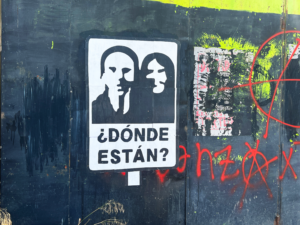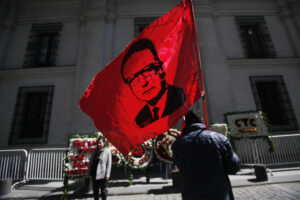Untangling Elite Opposition to Indigenous Rights in Chile
Throughout Chile’s constitutional process, elites have opposed Indigenous demands in defense of the status quo. Members of the Chilean Constituent Convention and supporters of the Mapuche Indigenous pose for a group photo holding signs against rejection of the militarization of the La Araucania region in southern Chile, during a march in front of the La Moneda presidential palace, in Santiago, Chile, Thursday, Nov. 4, 2021. Yesterday one Indigenous person was shot dead during clashes in the southern region of Biobio after the Chilean government had decreed a state of emergency and mobilized government forces in an attempt to reduce ongoing violence. (AP Photo/Esteban Felix)
Members of the Chilean Constituent Convention and supporters of the Mapuche Indigenous pose for a group photo holding signs against rejection of the militarization of the La Araucania region in southern Chile, during a march in front of the La Moneda presidential palace, in Santiago, Chile, Thursday, Nov. 4, 2021. Yesterday one Indigenous person was shot dead during clashes in the southern region of Biobio after the Chilean government had decreed a state of emergency and mobilized government forces in an attempt to reduce ongoing violence. (AP Photo/Esteban Felix)
This article first appeared in NACLA. Subscribe to NACLA’s newsletter here.
Beginning in October 2019, the Mapuche flag became a regular fixture at the mass protests known as the estallido social across Chile. In multiple cities, demonstrators toppled statues of colonizers, rejecting the symbols of centuries of colonialism and oppression. Since the uprising, Indigenous rights have become an increasingly prominent part of Chilean political conversations. When 155 delegates began drafting a new constitution in 2021, 17 were Indigenous representatives, and Mapuche scholar Elisa Loncon served as president of the Constitutional Convention for the first six months. Together with other representatives, their work led to the inclusion of many Indigenous rights and recognitions in the draft constitution.
In Chile, Indigenous rights fall behind international standards and the recognitions enshrined in other countries in the region. Although the draft constitution represented a significant shift towards upholding Chile’s international commitments, such conversations about Indigenous rights were new to many Chileans. Throughout the constitutional process, political elites circulated ambiguous, deceptive, and incorrect information about Indigenous rights that often went viral on social media or became fodder for primetime TV. The most frequently repeated claims asserted that Indigenous rights recognitions would eliminate private property and would allow Indigenous communities to secede from Chile and veto all future political reforms.
In a plebiscite on September 4, 2022, 62 percent of voters rejected the draft constitution. According to a poll by Cadem carried out days after the vote, plurinationalism and Indigenous autonomy were the second most referenced reason for voting “Rechazo” (reject); 35 percent of survey respondents listed it as one of their reasons, and 16 percent mentioned it first.
Indigenous rights, and particularly plurinationalism, figured prominently in analyses of the plebiscite result. In the wake of the vote, right-wing politicians and those in the Rechazo camp repeated campaign language that implied that a vote against the draft constitution was a vote against Indigenous rights: “Chile is one,” “Thank you for defending Chile,” and “We want peace.” Right-wing former presidential candidate José Antonio Kast said the plebiscite highlighted the “failure” of current President Gabriel Boric’s government and called on the administration to “stop the advance of terrorism and violence in rural areas, in Arauco, Araucanía, and the north.” Deflecting from addressing rights recognitions and Indigenous demands, this strategic language called for immediate responses to concerns about insecurity, selectively naming locations many Chileans would associate with the so-called “Mapuche conflict” in the south (and with migrants in the north).
Boric, for his part, called in a speech on September 4 for building on existing consensus around women’s and children’s rights; Indigenous rights were noticeably absent from this call to action. Two phrases implicitly communicated that the government would move forward with a muddled approach to Indigenous rights. First, in a passage reminiscent of “Chile is one” rhetoric from those opposing the constitution, Boric said: “We … know that we have one culture, traditions, and symbols that we must respect and honor.” Then, discussing the government’s “obligation to meet the demands of our compatriots in their daily lives,” Boric listed “insecurity” and “violence in the south” as areas where Chileans “expect strong answers and solutions.” While ambiguous, these statements suggested to voters that the government would significantly scale back their work to promote Indigenous rights recognitions to appease concerns about division and security.
Snapshots of Chilean history from 2019 to 2022 reveal two concerning trends in how Chilean political elites justify their opposition to Indigenous rights and demands. First, critics equate Indigenous rights recognitions with the absence of the state and explicitly link recognizing rights to preventing the state from responding to security concerns. This logic calls for prioritizing security claims over rights demands. Second, critics frame Indigenous rights as antidemocratic. They claim Indigenous rights recognitions violate the principle of one person, one vote by denying the will of voters who elect politicians whose platforms call for strong policing to address insecurity attributed to Indigenous activists, as in the case of recent right-wing platforms calling for militarization in southern Chile.
Both arguments leverage the language of stability, peace, democracy, and development within the power and structure of the existing state to oppose Indigenous rights recognitions. The Rechazo campaign capitalized on these arguments, activating underlying insecurities among non-Indigenous Chileans. Of course, the inability of the existing Chilean model of inequality and exclusion to respond to citizen demands was a root cause of the 2019 uprising. First in the streets and then at the ballot box—in the October 25, 2020 vote overwhelmingly in favor of drafting a new constitution as well as in the 2021 presidential election—many Chileans have expressed that reforms are not enough. Concerningly, however, arguments to preserve the existing model of Chilean governance gain traction when discriminatorily deployed in opposition to Indigenous rights.
Right-wing politicians frequently approached Indigenous rights conversations with a protectionist logic, framing Indigenous representation as compensating for prior wrongs.
As protests continued in late 2019, politicians negotiated a possible process of rewriting the constitution. A November agreement ensured that the body charged with drafting the new charter would have gender parity, but Indigenous representation remained unaddressed. After a year of debate, Law 21.298 established that 17 of the 155 seats in the Constitutional Convention would be reserved for Indigenous representatives, relatively matching the percentage of Chileans who identify as Indigenous. This agreement was reached in December 2020, after nearly 80 percent of Chileans voted in October 2020 in favor of rewriting the constitution via a Constitutional Convention.
The legislative debates over this law previewed the misunderstandings about and opposition to Indigenous rights that later appeared in the run-up to the September 4 plebiscite. Right-wing representatives framed the reserved seats as antidemocratic, claiming that recognition of collective rights would come at the expense of individual rights. The right-wing Renovación Nacional (RN) party went so far as to equate reserved seats with appointed senators, a legacy of General Augusto Pinochet’s dictatorship that remained in place until 2005. Opposing the legislation, Senator Jacqueline van Rysselberghe of the right-wing Unión Demócrata Independiente (UDI) argued: “I deeply believe in representative democracy, and I believe that everyone’s vote is worth the same. Therefore, generating reserved seats for different groups, however valuable they may be, seems to me to distort that.” She later made headlines for claiming that if Indigenous groups would have reserved seats, so too should other “interest groups,” such as Christian communities.
Right-wing politicians frequently approached Indigenous rights conversations with a protectionist logic, framing Indigenous representation as compensating for prior wrongs. Senator Francisco Chahuán of RN said: “We have an outstanding debt, and we have to start paying it.” Framing Indigenous rights through this logic of payment and compensation situates Indigenous discrimination and exclusion in the past, as finite, and as possible for the existing state to resolve in the present. And while the state management of Indigenous identity rejects international standards of self-identification, many politicians called for the state to define, manage, and oversee which Indigenous communities would have reserved seats, who could run for those seats, and who could vote for those candidates. In an article for the Center for Investigative Journalism (CIPER), Antonia Rivas Palma, a lawyer, academic, and adviser to the Constitutional Convention on Indigenous rights, critiqued this state control: “The strategy was to only recognize the ‘authentic’ Indigenous, who is not mixed nor has migrated to the city; one who does not belong to the modern world and therefore complies with the stereotypes that those of us who are not Indigenous have about how an Indigenous person should be.”
In contrast, Indigenous rights activists, policy experts, and many left-wing legislators spoke of reserved seats as a power-sharing measure that would support the broadening and strengthening of democracy. This position suggested an ongoing, active commitment to the recognition and exercise of Indigenous rights as integral to the larger project of undoing and remaking democracy. In justifying his vote in favor of the legislation, Senator Francisco Huenchumilla, a prominent Mapuche politician of the center-left Partido Demócrata Cristiano (PDC) noted that reserved seats would ensure the Constitutional Convention process “had a high degree of legitimacy through the participation of the different sectors that make up our pluralistic and diverse Chilean society.”
On October 12, 2021, President Sebastian Piñera declared a 15-day state of exception in four regions in southern Chile that are home to many Mapuche communities. Multiple administrations have militarized the region, a decision that protects the interests of the dominant extractive industries and delegitimizes Mapuche mobilization and demands for territorial rights. The measure was later extended, first by Piñera and then by Congress. A state of exception triggers military deployment and allows the government to limit freedom of movement and assembly.
Justifications for the move can be contradictory. Often, administrations say the measure responds to insecurity resulting from the so-called “Mapuche conflict” between Mapuche activists and state forces. But Piñera also claimed to be responding to “repeated acts of violence linked to drug-trafficking, terrorism, and organized crime committed by armed groups.” For protesting truckers who had blocked roads in the region for a week to demand more security, the declaration was enough to end their blockade. But many strongly criticized the state of exception for criminalizing Mapuche mobilization by responding to Indigenous rights demands with the state security apparatus, rather than treating them as legitimate. Then-presidential candidate Gabriel Boric was one of these critics, although since entering office he has also declared states of emergency in the area.
For Elisa Loncon, then-president of the Constitutional Convention, the legislative decision to extend the state of exception in early November 2021 came as a “very bad gesture … just as we are establishing plurinationality and talking about recognizing rights.” When Congress approved another extension later that month, she added that the militarization had “openly violated the rights of people and communities that have nothing to do with the conflict.”
Loncon faced an explosion of criticism, particularly from right-wing politicians. A hashtag trended, demanding her resignation: #LonconRenuncia. The political elites critiquing her position framed violence and insecurity in southern Chile as a problem of the absences of the state to be solved with more state intervention—specifically, a militarized state. For example, Piñera’s Minister of the Interior Rodrigo Delgado reasoned: “Just as she demands respect for the autonomy of the Convention, it would be good if she respected the autonomy of the State.” Senate president Ximena Rincón of the PDC went further: “We must recognize that there has been an absence of the state and when this happens, everything we do not want appears: violence, drug trafficking, drugs.” And UDI’s Senator Iván Moreira more explicitly linked Mapuche territorial demands to the region’s security: “The mixture of territorial claims with high-caliber crime has generated a breeding ground that only benefits those who do not believe in the rule of law and who promote heavily armed paramilitary groups.” These reactions called for a greater state presence and for Mapuche communities to channel their demands through existing state mechanisms, despite extensive evidence of the exclusionary, discriminatory, and often violent logic of these processes.
Other critics painted Loncon’s comments as antidemocratic. Senator Felipe Kast of the right-wing Evolución Política party from Araucanía tweeted: “@ElisaLoncon should know a bad gesture is turning your back on 150,000 people who voted [referencing voters electing politicians calling for more policing]. A bad gesture is validating drug terrorism in Araucanía. A bad gesture is linking Mapuche people to those who commit violence, because the Mapuche people are peaceful.” When Loncon was named in the Financial Times (FT) list of 25 most influential women of 2021, the right-wing UDI party wrote a letter to FT contesting the choice. The letter claimed Loncon’s leadership “has had serious antidemocratic features” and cited times they claimed Loncon had censored representatives or conversations that contrasted her politics.
These exchanges show how right-wing politicians drew heavily on language of security and democracy to justify their opposition to Indigenous demands. Politicians equated Indigenous demands with the absence of the state as well as terrorism, violence, and narcotrafficking; the appropriate response, according to their reasoning, was to extend the state’s power in the region with a state of exception. When Loncon stated publicly that militarization violated Indigenous rights and was incommensurate with the political work of reimagining the state and Indigenous-state relations via the rewriting of the constitution, the right-wing political elite countered her argument by framing it as antidemocratic. They claimed voters granted them a democratic mandate to prioritize security over Indigenous rights and broader protest demands. At the same time, they also trotted out less veiled racist and sexist attacks against Loncon and other opponents.
Recognizing the country as plurinational would have established the existence of multiple nations within the political administrative structure of one state.
Leading up to the September 4 plebiscite, one of the Rechazo campaign’s main talking points was critiquing the draft constitution’s recognition of Chile as plurinational. Article 1 proposed that “Chile is a social and democratic State governed by the rule of law. It is plurinational, intercultural, regional, and ecological.” If approved, the charter also would have enshrined a number of internationally recognized Indigenous rights.
Recognizing the country as plurinational would have established the existence of multiple nations within the political administrative structure of one state. This recognition of Indigenous communities as peoples and nations is foundational for other Indigenous rights, as it would establish grounds for political empowerment and degrees of political, territorial, judicial, and cultural autonomies. As a party to the UN Declaration on the Rights of Indigenous Peoples and ILO Convention 169 on Indigenous and Tribal Peoples, Chile already internationally commits to many of these Indigenous rights recognitions. But Chile falls behind most Latin American countries in failing to legislate these rights and recognitions. The recognition of Chile as plurinational in the draft constitution offered a dramatically new vision for the Chilean state and Indigenous-state relations.
While those following the Constitutional Convention were not surprised to see the language of plurinationalism in the final draft of the constitution, the Rechazo campaign made this word a scapegoat and subjected it to significant misinformation. A few trends in the Rechazo campaign’s rhetoric shed light on why plurinationalism has been so controversial. First, political elites framed plurinationalism as privileging Indigenous peoples by creating “inequality before the law,” a phrase the campaign used frequently. During a debate in the Constitutional Convention in April, UDI representative Marcela Cubillos, who previously served as Piñera’s minister of education, said: “Equality has already failed, this proposal for a constitution is a tribute to inequality before the law. The constitution will be a symbol of inequality. One filled with privileges for activists of the Indigenous agenda.” Although the draft constitution also recognized many universal rights of individuals, political elites frequently invoked this language of division to claim that collective Indigenous rights recognitions were privileges that came at the expense of non-Indigenous, second-class Chilean citizens.
A July 2022 opinion piece by prominent journalist Daniel Matamala highlighted the absurdity of this line of thinking. The column responded to RN Senator Manuel José Ossandón’s comment that the convention had “transformed Indigenous peoples into first-class citizens, and Chileans who are not Indigenous, are second class” and other similar claims. Matamala argued that while Chile’s 1980 Constitution guarantees formal legal equality, Chileans deeply understand that this does not translate to substantive equity. He cited the overrepresentation of Spanish last names like Errázuriz in positions of power and Mapuche last names at the opposite end of the societal hierarchy. He challenged those subscribing to Ossandón’s argument to consider if they truly believed the recognition of Indigenous rights would make them second-class citizens. These arguments about legal and substantive equality reveal the Rechazo campaign’s strategy of using the language of privilege and justice to counter Indigenous rights recognitions, while ignoring the glaring inequalities impacting Indigenous communities.
Second, the Rechazo campaign debated international precedents and comparisons, highlighting cases of plurinationalism that political elites believe Chile should not aspire to. Such discussions frequently implied that developed, stable countries have certain types of constitutions, which do not recognize plurinationalism, and that Chile should follow these examples. Constituent assembly representative Ruggero Cozzi Elzo, for instance, tweeted: “It is not true that the ‘Plurinational State’ has been taken from developed countries. The model being offered to Chile is that of the constitutions of Ecuador and Bolivia.” This comparison also prompted a heated debate in a series of opinion pieces published in El Mercurio about whether the United States recognizes plurinationalism. First, based on unclear determinations and evidence, economist Klaus Schmidt-Hebbel claimed the United States and Germany do not have plurinationalism. Lawyer Jorge Contesse countered by citing the 1832 Supreme Court decision Worcester v. Georgia as evidence of plurinationalism in United States—a complicated example as the precedent was not enforced. Lawyer José Gabriel Alemparte and Convention representative Felipe Harboe opposed that view, claiming that the United States does not have plurinationalism because Worcester v. Georgia and the 2022 Oklahoma v. Castro-Huerta do not establish the independence of Indigenous communities—an argument that erroneously presents plurinationalism only as independence and separation of Indigenous communities from the state. Certainly, these arguments fail to capture the ugly histories of how the U.S. government has subjected Indigenous communities to centuries of violence and exclusion, and plurinationalism does not causally determine a country’s development or stability. These debates highlight how the Rechazo campaign used racist and classist aspirational overtones, and selective moments of U.S. history, to equate plurinationalism with a particular undesired type of country.
Third, the Rechazo campaign claimed plurinationalism would divide both Chilean society and the Chilean state, despite Article 3 establishing Chile as one indivisible territory. These discussions frequently invoked Bolivian plurinationalism to stoke fears and equate Indigenous rights recognitions with instability and division. They linked President Evo Morales’s terms in office (2006-2019) and Bolivia’s 2009 plurinational constitution drafted under his watch with the political violence and turmoil that followed the country’s 2019 presidential election. In July 2022, UDI politicians Eduardo Cretton and Carol Bown traveled to Bolivia to learn about the implementation of plurinationalism. They concluded that plurinationalism threatened unity. Cretton tweeted: “Chile is one. One of the great hopes of this process was to achieve a more united and cohesive country and, clearly, plurinationality does not contribute to or help that, it generates more division and separation. That is one of the lessons that the trip to Bolivia taught us.” Similarly, Bown tweeted: “One of the sad things that happened to us in Bolivia was that they told us the national flag was transformed into the opposition flag. We do not want that for Chile. The Convention’s proposal divides us as Chileans.” Social media chatter and memes questioned if Chile’s national soccer team would have one jersey, one national anthem, and one flag if Chile was recognized as plurinational, revealing how these arguments mapped onto and filtered into Chileans’ anxieties.
The popular protests launched in October 2019 rejected the Chilean model of governance and citizenship created by the 1980 Constitution. The work of the Constitutional Convention offered the power of democracy to undo this legacy and remake a more just, equitable, and inclusive Chile. As highlighted in these few snapshots since 2019, political elites have opposed Indigenous rights by framing them as detrimental to the liberty, development, democracy, and stability of Chileans. Certainly, these ugly discourses about and violations of Indigenous rights persist throughout Chilean history. In the current political moment, elites deployed this exclusionary and discriminatory logic in attempts to scare Chileans into sacrificing the promises of the draft constitution in favor of upholding the status quo.
Conversations have already evolved since the September 4 plebiscite, particularly regarding plurinationalism. Many activists and policy experts reflected on how plurinationalism became an academic, legalistic discussion. A 2018 survey previewed this: 59 percent of citizens favored recognition of Chile as multicultural and 6 percent as plurinational, while among members of Congress, 48 percent favored multicultural and 34 percent plurinational. Natalia Caniguan, anthropologist and researcher at the Center for Intercultural and Indigenous Research (CIIR), concluded that conversations about plurinationalism stayed too elitist, and plurinationalism should better be thought of as a “last name” on the broader project of advancing Indigenous rights recognitions. There has also recently been additional attention to the Indigenous activists rejecting plurinationalism as too statist and gradual. Mapuche activist Hector Llaitul, a frequent target of state repression and jailed at the time of the plebiscite, has been the most public voice to articulate this position.
It is unclear how future processes to replace Chile’s 1980 Constitution will address Indigenous rights. At the time of writing, the mechanism for the redrafting is yet to be determined. Regardless of the process, it will be essential to resist exclusionary, discriminatory logics that reject Indigenous rights using claims about security and democracy. The recognition and exercise of Indigenous rights is integral to and intersects with other essential reforms that will be necessary to deliver on the promises of transformation for both Indigenous and non-Indigenous citizens in Chile.
Your support matters…Independent journalism is under threat and overshadowed by heavily funded mainstream media.
You can help level the playing field. Become a member.
Your tax-deductible contribution keeps us digging beneath the headlines to give you thought-provoking, investigative reporting and analysis that unearths what's really happening- without compromise.
Give today to support our courageous, independent journalists.






You need to be a supporter to comment.
There are currently no responses to this article.
Be the first to respond.